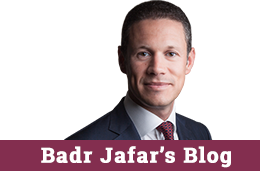Why The Arab World’s Business Leaders Must Stand Up & Be Counted
I had the pleasure of being interviewed by Inc Arabia Magazine for their ‘Business for Good’ issue for October 2016. Read the full interview:
For Badr Jafar, the long debate between doing well and doing right is now redundant.
“No longer is this discourse about a zero-sum game where there needs to be a trade-off [between them]. I think businesses are now starting to realize that there is a symbiotic relationship between the two.”
For Jafar, CEO at Sharjah, UAE-based Crescent Enterprises, a company that employs over 4,800 people in 20 countries across five continents, this goes beyond the balance sheet. It is about making a model company out of the family business—one that promotes a culture of transparency, accountability, and social awareness.
“Preaching never works. There is no better way to create a cultural shift than to do things yourself and then tell your story. That is taking successful examples and using them as real life success stories, which other people can take inspiration from.”
And indeed, Jafar walks the talk. Apart from attending to all that it takes to run a multi-million-dollar conglomerate, the main item on his agenda is promoting a culture of corporate accountability and transparency among the region’s many family businesses, which account for around 80% of the region’s non-oil gross domestic product (GDP).
It starts from within
For decades, private companies in the region, of which a majority are family-run, have been known for letting little information come out of their inner workings. The lack of taxation has helped—there was and is no regulatory reason to publish reports—to promote an environment where transparency is not high up on the list of business goals.
Over one trillion dollars in assets are going to be passed on from one generation to the next over the next ten years in the Arab world, according to the IMF. With this great fortune, comes great responsibility, Jafar tells us.
“This generational transition is mainly between the second and the third generation because most of our [region’s] family businesses are relatively young.”
“The passing on of assets between the second and third generation is traditionally the most dangerous transition. And according to global statistics, less than 15% of family businesses survive beyond the third generation. The majority of these failures are not because the market is demonstrating that these companies are now irrelevant, but in fact, in most cases, it is because of governance challenges.”
These numbers hit close to home for Jafar, who’s not just heading Crescent Enterprises, where all the family’s non-energy businesses are parked. He is also the managing director of the family’s holding company Crescent Group, headquartered in Sharjah, and the president of Crescent Petroleum, which his father established in the late 1960s as the first independent and privately-owned Middle Eastern petroleum company.
“The problem we face is that while existing businesses, such as the Crescent Group, can be our biggest opportunities, they can also be our biggest risks,” he says. “If we don’t protect and nurture our existing businesses and make sure that they are as healthy as possible to generate further growth and more jobs, then we have a problem.”
Jafar set out to solve this problem in 2010 when he co-founded the Pearl Initiative, a regional business organization in partnership with the United Nations Office for Partnerships, to promote a corporate culture of transparency and accountability within the Gulf region of the Middle East.
Through reports, panel sessions and executive workshops conducted throughout the year, the organization tries to tackle issues such as governance in family firms, diversity in leadership, anti-corruption, integrity in the supply chain and integrated reporting.
To date, the organization has managed to sign up over a hundred companies and attracted thought leaders from around 50 partner companies representing all Gulf states, such as Majid Al Futtaim Group, KPMG, Philips, Chalhoub Group, PwC, General Electric, SABIC and Al Jomaih Group.
Carla Koffel, executive director of the Pearl Initiative, is also a fervent believer in the role strong governance practices play in family-run firms.
“Embedding transparency and accountability within family businesses attracts the right talent, investment, improves staff satisfaction and creates a diverse and innovative thinking workplace culture over a period of time. It also fosters business sustainability, which ultimately drives economic competitiveness, innovation, and entrepreneurship.”
Change is here
Pearl Initiative’s Governance Practices in GCC Family Firms report, developed in partnership with professional services firm PricewaterhouseCoopers, revealed that although 63% of assessed firms have codes of corporate ethics, only 31% of them have fully implemented these measures and at least 24% had not implemented them at all.
This is a cause for concern, according to Koffel, because the numbers show that although awareness is growing, businesses in the GCC still need to take stronger and stricter measures towards implementation of governance measures.
Yet, Koffel believes that things are starting to shift in the region—Pearl Initiative’s report showed that the majority of those interviewed acknowledge the importance of corporate governance and transparency.
Other signs of progress are the different measures that the public sector has started implementing to enforce accountability regulations across the board, Koffel tells us.
“Institutions such as the UAE Securities and Commodities Authorities are implementing governance rules and corporate discipline standards,” he says. “The UAE also set up an anti-corruption task force unit to investigate financial breaches and corruption, scrutinize legislation, test financial and administrative systems and ensure accountability.”
Saudi Arabia also launched the National Anti-Corruption Commission to tackle financial and administrative corruption in 2011, and both Bahrain and Oman have in the recent past issued new governance codes.
Introduction of regulatory measures, however, is only the first step, says Koffel, adding that it is more important that corporations—whether large, small or family-owned—really understand the economic, financial and social benefits of putting in place a strong governance policy.
“Arguably, the economic tsunami that was created as a result of the economic collapse in some markets in 2007-2009 happened fundamentally because of a failure of corporate governance in some of the highest regulated environments,” Jafar points out.
“Hence, rules and regulations will only get you so far, and unless businesses actually see the business case and identify the business case for these practices and influences, we are not going to see the changes in practice that we need to see to protect and generate value.”
Doing it right
Jafar sees these measures towards promoting accountability and transparency as the first steps towards a larger goal he and others envision for the region—where entrepreneurship becomes a key tool to overcome the many socio-economic challenges it has been facing.
“Entrepreneurship for entrepreneurship’s sake misses out on a lot of opportunities. So, we need to be very clear before we start generating all sorts of ideas left, right and center,” he says. “We first need to identify what the needs are. What are the needs of our community? What are the challenges that we need to address? They might be social, environmental, or educational. They are obviously about job creation and the skills gap. They are about improving the state of affairs in relation to women in business and on boards.”
“I can go on and on, but these are [only] some [of the] issues, which we face here in the Gulf and the Middle East,” he adds.
These problems and the questions on how to solve these problems is what the Arab World Social Entrepreneurship Program (ASEP), which Jafar launched in collaboration with Ashoka, a global non-profit that coined the term ‘social enterprise’ in the 1980s, aims to do.
Designed to build the skills of early-mid stage social innovators in the Gulf, ASEP selects a group of social innovators and provides them with intensive mentoring to help them create detailed business plans for their initiatives.
“Social entrepreneurship is very contextual…what a social entrepreneur in New York might be looking to deal with in terms of challenges will be very different from someone sitting in Abu Dhabi or Riyadh or Beirut. So we have to look at the context which we are in and then identify business-led solutions to innovatively tackle the problems,” adds Jafar.
The weight of Jafar and the businesses he leads has helped the program make incremental gains in the pursuit of its goals. Iman Bibars, a regional director for Ashoka, points that out, saying that such an ambitious initiative requires multi-stakeholder participation “if it is really to achieve the impact we want, and it takes time to build these relationships and generate this support.”
“The most important thing, from our point of view, to encourage social entrepreneurs, is to make sure that multiple stakeholders from the business sector, the social sector, the media and educational institutions are working together to create an ecosystem that supports their growth,” says Bibars.
To a similar goal, Jafar is also a founding board member of the UAE chapter for Endeavor, a global non-profit organization, which supports high-impact entrepreneurs around the world.
Noor Shawwa, managing director at Endeavor UAE, is very optimistic about the direction the entrepreneurial ecosystem is taking in the region. “Social entrepreneurs are extremely important for maintaining balance in today’s society, and we are fortunate that more and more are emerging [in the region].”
But he adds that there should be more awareness to dispel the false impression that socially conscious companies sacrifice profitability for the sake of the causes they support, which can be mitigated by the private sector being more actively involved in promoting entrepreneurship—something Jafar concurs with wholeheartedly.
“Big corporations also need to be more entrepreneurial. Now more than ever, businesses need to feel a sense of urgency to innovate,” says Jafar. “We all need to be disruptive. Technology is changing everything, so we need to embrace that and evolve with it.”
“Take GE for example. It moved its headquarters to Boston, not because they wanted to be close to the ocean, but because they felt that they needed to be in the midst of this tech hub and education hub…to be close to where all the new innovations and technologies are being created and being thought of,” he says.
Setting up CE-Ventures, the business incubation division within Crescent Enterprises, which develops early-stage concepts into economically viable and scalable businesses that generate inclusive social impact, is Jafar’s attempt in that direction.
“We believe disruption is imperative to the sustainability of any business. At the same time, we need to be mindful of the circumstances we live in today. At CE-Ventures, we attempt to find long-standing solutions to the challenges we face, not just regionally, but across the globe,” says Samer Choucair, VP at CE-Ventures.
“We find that this approach of social entrepreneurship not only guarantees longevity to the company because of its impact on the societies it operates in, but also enables the ‘social quotient’ to directly impact the bottom line,” he says.
CE-Ventures is currently developing an industrial uniform prototype that seeks to address the extreme climate needs of workers across the Middle East.
“As temperatures continue to rise the world over, the workers who suffer the most are the ones working under harsh climatic conditions, especially here in the Middle East,” Choucair explains. “This product is not only for the region, but signifies the innovation from the region that has global implications.”
Do more, every time
Jafar also wants to encourage family-run businesses to take more active steps to enhance their impact on society through taking charge of their Corporate Social Responsibility (CSR).
However, CSR takes on a different name at Crescent Enterprises because Jafar believes that the old school methodology of mechanically calculating a percentage of retained earnings and handing it out is not enough to create a real impact on the ground.
“We call it Corporate Citizenship because we see it as much more holistic. We want to create new initiatives with the civil society as well as with the government that are very key not just to our business but also to the society and the environment in which we live in.”
Crescent Enterprises’ Corporate Citizenship program allocates a minimum of 5% of the company’s total earnings directed towards creating these social initiatives. Being a staunch advocate of the arts and its role in fostering society, this is where Jafar has decided to invest a big part of that 5%. This comes as a natural progression of brand diplomacy, a way to create social value and encourage cross-cultural dialogue, he believes.
“I see the importance of art as being permanent. Historical innovations happened at the intersection between arts and humanities. If we look back at our own region during the golden age, there was an incredible fusion of talents and cultures and faiths from all parts of the world coming together in a melting pot to create these amazing innovations.”
“The engineer and the scientist are the celebrities of the day. And the artist has become the ornamental kind of commodity. So, we need to move from the ornamental to the fundamental. In order to spark innovation in the region, we need to not only build buildings but also create and celebrate the arts that will fill these buildings.”
But Jafar is not using music and film to indulge himself—he sees it as a viable vehicle for social good. One of his recent projects was to co-produce a charity single in partnership with singer Quincy Jones, proceeds from which went to initiatives such as the World Food Program, Abu Dhabi Music and Arts Foundation and Save the Children’s innovative HEART initiative. In 2014, Jafar also launched the Middle East Theatre Academy (META), to nurture the growth of creative arts and development among the youth from across the region.
This partnership resulted in the production of Dhow Under the Sun, a play which was inspired by the lives of displaced youth and created by 34 young men and women from 12 different countries from across the Middle East.
“There is always politics involved when you discuss topics such as population displacement. But, the playwright used the notion that there were rising sea levels because of environmental changes, which forced populations to move. The play cleverly tackled several challenges we are facing today, from the refugee situation and the multiethnic environment we live in, to climate change. And it’s all brought together and created on a creative platform such as theater.”
Jafar’s interest in the refugee crisis goes beyond this project. In 2015, he was appointed by the United Nations’ Secretary General Ban Ki Moon to join a high-level committee that aims to address the growing humanitarian crisis of refugees. He staunchly believes that addressing this crisis doesn’t solely fall on the shoulders of non-profit organizations and that businesses must do more.
“Today, there are around 125 million people who have been displaced. That’s equivalent to the 11th largest country in the world. So, we have a massive challenge ahead of us, but we are not using all the tools that are available to us in our toolbox,” he says.
Jafar highlights that the private sector accounts only for 5% of all global funding for humanitarian donations.
“Why is that? The main reason is that the vast majority of humanitarian crises today are caused by human conflict and wars or in other terms, politics, which is something businesses tend to stay far away from,” he opines.
“There are many ways to unlock more funds, but it is not just about funds. Businesses are not [just] checkbooks, they are [also] networks, products, and services. And unlocking their full potential can help solve a lot of problems we are facing in this aspect. And creating resilient communities inherently creates stable societies which in turn generate stable businesses, so it is in our enlightened self-interest to get involved.”
Businesses simply must do more, Jafar urges.

 Tweets by @BadrJafar
Tweets by @BadrJafar


